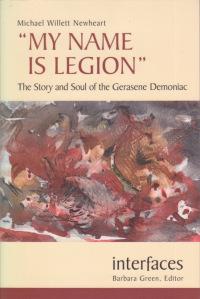 One thing you can say for the Bible—it’s been interpreted six ways to Sunday.This point was brought home to me in reading Michael Willett Newhart’s “My Name Is Legion”: The Story and Soul of the Gerasene Demoniac.Part of the Interfaces series, now apparently defunct, it takes an unusual biblical character and explores it.Them, in this case.The story of the Gerasene or Gadarene demoniac is one of the more famous episodes in the Synoptic Gospels.Jesus and the disciples cross the Sea of Galilee and the possessed man runs out at them.He has superhuman strength, and he lives among the tombs.Jesus asks the man, or the demon, its name only to receive the reply “Legion.”He then casts the demons into a herd of swine that drown themselves in the lake.
One thing you can say for the Bible—it’s been interpreted six ways to Sunday.This point was brought home to me in reading Michael Willett Newhart’s “My Name Is Legion”: The Story and Soul of the Gerasene Demoniac.Part of the Interfaces series, now apparently defunct, it takes an unusual biblical character and explores it.Them, in this case.The story of the Gerasene or Gadarene demoniac is one of the more famous episodes in the Synoptic Gospels.Jesus and the disciples cross the Sea of Galilee and the possessed man runs out at them.He has superhuman strength, and he lives among the tombs.Jesus asks the man, or the demon, its name only to receive the reply “Legion.”He then casts the demons into a herd of swine that drown themselves in the lake.
Newhart approaches the story creatively, first by considering the Gospel of Mark as a book, and then treating his version of the story via narrative criticism.This was pretty good, and I learned quite a bit from his analysis.The book then moves on to psychological criticism.I have to admit that this approach is one I haven’t ever used and, like many reader-response methods, it can seem somewhat arbitrary.That’s not to suggest it shouldn’t be utilized, but rather to note that results could be uneven.Your psyche’s not my psyche, savvy?Subjective approaches may be all that we really have when considering an ancient text, but I always tend to look at things historically.
This book caught my attention because I’m researching demons.You can’t really ignore a book with this title if you’re trying to figure out how the New Testament looks at them.In any case, the historical method seems to me the only way we can really engage the question of what the ancients thought demons were.I don’t want to say too much or you won’t have any reason to buy my next book.(That’s a joke, by the way, before anyone suggests I’m exploiting my readers.)Newhart doesn’t really raise the question of what demons are.He does briefly mention The Exorcist, but it isn’t his main interest.The character of Legion, however, is difficult to place if we can’t really say what demons are.I did find the allusion to the Roman occupancy to be worthy of consideration.The demoniac, however, may have begged to differ.It couldn’t have been easy being an unnamed character in the Good Book.And demons are often not what they seem.
